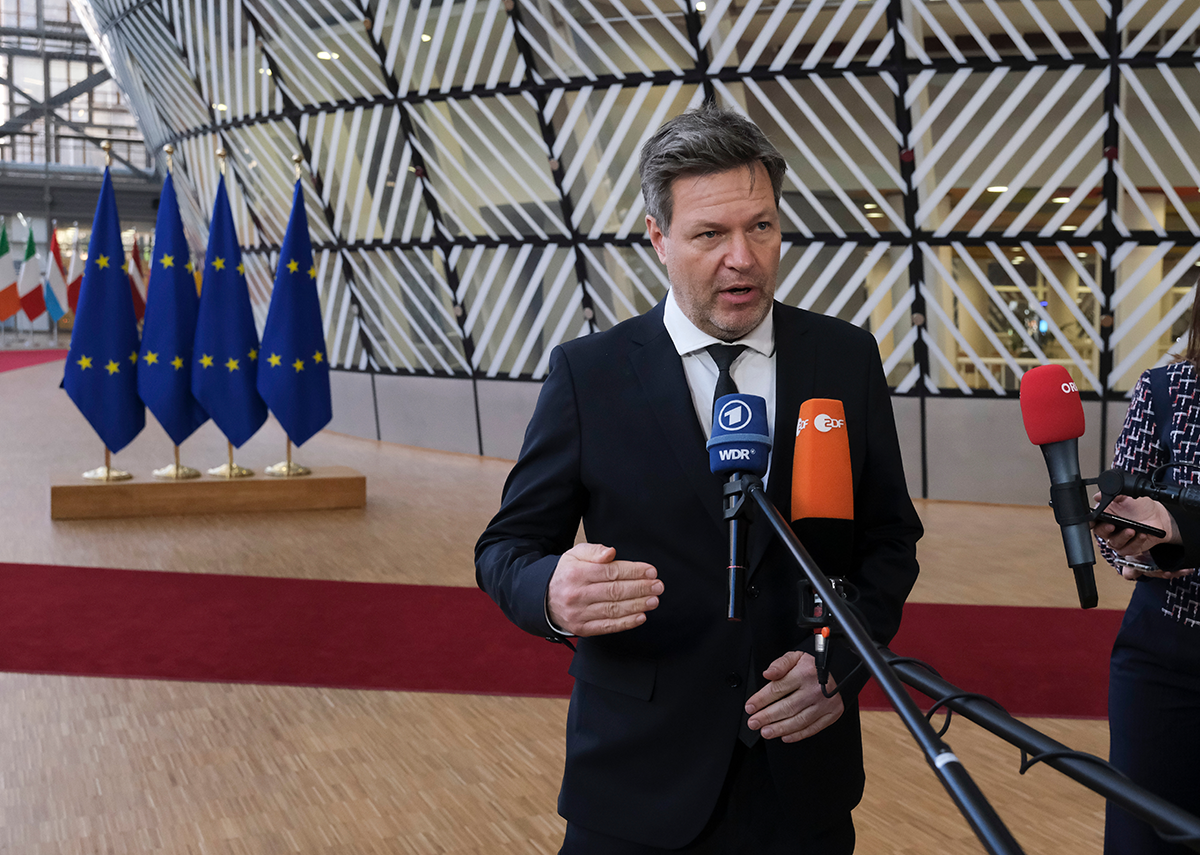
❌ Economic slowdown ❌ German economy is stagnating ❌ Robert Habeck, Deputy Chancellor and Federal Minister for Economic Affairs and Climate Protection of the Federal Republic of Germany - Image: Alexandros Michailidis|Shutterstock.com
Analysis of the current economic situation in the Federal Republic of Germany and the European Union
Slack in the gross domestic product (GDP) of the Federal Republic of Germany
The gross domestic product (GDP) of the Federal Republic of Germany recorded unexpected stagnation in the second quarter of 2023. Compared to the previous quarter, economic output remained unchanged after a slight decline of -0.1 percent in the first quarter. This unexpected result raises questions and requires a thorough analysis of the underlying factors.
Europe-wide economic challenges
Not only Germany, but also the entire European Union (EU) is struggling with stagnating economic performance. The GDP of all EU countries remained unchanged on average, indicating a broad economic challenge. In contrast, the Eurozone recorded a growth spurt of 0.3 percent quarter-on-quarter in the second quarter. Countries such as France (+0.5 percent) and Spain (+0.4 percent) in particular contributed to this growth.
Factors influencing the German economic downturn
Increased interest rates and persistent inflation
Experts agree that increased interest rates and persistent inflation are having a dampening effect on the German economy. The monetary policy of the European Central Bank (ECB) influences interest rates and thus the willingness of companies and consumers to invest and consume. Persistent inflation increases costs for businesses and reduces consumers' purchasing power, which in turn dampens demand for goods and services.
Restrained demand from abroad
The German economy is strongly export-oriented, so demand from abroad plays a crucial role. Global economic uncertainty and trade conflicts can make foreign buyers reluctant to buy German products. The restraint in international demand can significantly impact the growth of the German export industry.
Outlook for future development
Economic research institutes and bank economists largely agree that the German economy will shrink slightly in 2023 as a whole. The dampening factors such as increased interest rates, persistent inflation and restrained demand from abroad are likely to continue to have a negative impact. This requires careful monitoring of economic developments and possible measures to stimulate growth.
Industrial production in the European Union
Surprising growth in industrial production
In addition to analyzing GDP, industrial production also provides important insights into a region's economic health. The latest data from Eurostat on industrial production in the EU showed a surprising turnaround in June. Production rose 0.5 percent month-on-month, although experts had expected a decline of 0.1 percent. This unexpected growth could indicate temporary factors or unforeseen changes in the production landscape.
Review of the annual development
However, industrial production on an annual basis still shows a decline of 1.2 percent compared to the previous year. This highlights the long-term challenges facing European industry. Structural changes, technology development and global competitive factors may have contributed to this decline.
Recommendations for action
Current economic data suggests that Germany and the European Union are facing significant challenges. The combination of increased interest rates, persistent inflation and an overall uncertain global economic situation is negatively impacting the region's growth. Experts recommend careful monitoring of developments, adjustment of monetary policy and targeted measures to promote investment and consumption to stimulate the economic recovery. The surprising development in industrial production is a reminder that economic trends are complex and require continuous analysis and adaptation to respond to unexpected changes.
📈 Robert Habeck's forecast and its implications
Taking into account the current economic downturn, Robert Habeck made an extremely optimistic forecast. He assumes that investments totaling 80 billion euros are possible in the near future despite the economic uncertainties. This bold statement naturally raises questions about how these investments will be achieved and what impact they could have on the economy and society.
💰 The planned investment areas
It is important to identify the areas where these investments should go. Habeck emphasizes that a large part should be invested in sustainable energy projects in order to advance Germany's energy transition. Additional funds could flow into education, healthcare and digital infrastructure. A detailed insight into these investment areas is crucial in order to understand the full extent of the planned measures.
🌍 The European perspective
The question of how these investments fit into the European context is of great importance. As an economic heavyweight nation, Germany not only contributes to its own stability, but also to strengthening the EU economy. This raises questions about how the investments could influence European cooperation and which partnerships could be strengthened.
⚖️ Challenges and concerns
Of course, potential challenges and concerns related to this forecast also need to be considered. Economic uncertainties, political factors and the feasibility of the planned measures could impact the success of these investments. It is important to look at these aspects critically in order to get a balanced picture.
📊 Impact on citizens and the economy
Ultimately, the focus should be on the impact of these investments on citizens and the economy. What benefits could people expect? How could the economy be stimulated by these investments? The immediate and long-term consequences of this forecast are very relevant.
📣 The latest headlines
- 80 billion euros despite the economic downturn: Robert Habeck's bold investment forecast
- Sustainable future: Habeck's vision of 80 billion euros in investments
- Investments for change: Robert Habeck's optimistic outlook despite the economic downturn
- European impulses: Habeck's prediction of 80 billion euros in investments
- Opportunities and challenges: Robert Habeck's forecast for massive investments
The future of the German economy: An analysis
Today we are facing numerous challenges that could impact Germany's economy. In this section we will take a detailed look at the future prospects, examine Olaf Scholz's role as Chancellor in this situation and discuss the criticism and views of economic experts.
Economic challenges
The German economy has proven itself in recent years, but there are increasing uncertainties that could lie ahead. A possible recession could have a significant impact and it is important to take the right steps to address these potential threats. 📉
Olaf Scholz and his vision
As Chancellor, Olaf Scholz is a central player in shaping Germany's economic future. His political views and strategies will play an important role in how the country deals with the challenges ahead. 👨💼
Criticism and viewpoints from economic experts
Various economic experts have expressed their concerns and assessments regarding economic development in Germany. Some see possible weaknesses in current strategies, while others take more optimistic views. It is crucial to understand these different perspectives and gain insights for the future. 💬💼
Innovation and technology as drivers
In an ever-changing global economy, innovation plays a crucial role. Promoting technology and new business models can help strengthen Germany's competitiveness and open up new opportunities. 🚀💡
Sustainability and environmental aspects
Germany's future economy will also be heavily influenced by environmental factors. Sustainability and ecological responsibility are becoming increasingly important. It is essential to develop strategies that balance economic growth with environmental protection. 🌱🌍
International Relations and Trade
The German economy is closely linked to international relations and trade agreements. How these relationships are shaped will have a major impact on how the country's economic future unfolds. 🌐🤝
Would you like two new shocking reports? The German start-up bubble bursts and the economy in Europe crashes
More about it here:
Would you like two new shocking reports? The German start-up bubble bursts and the economy in Europe crashes

